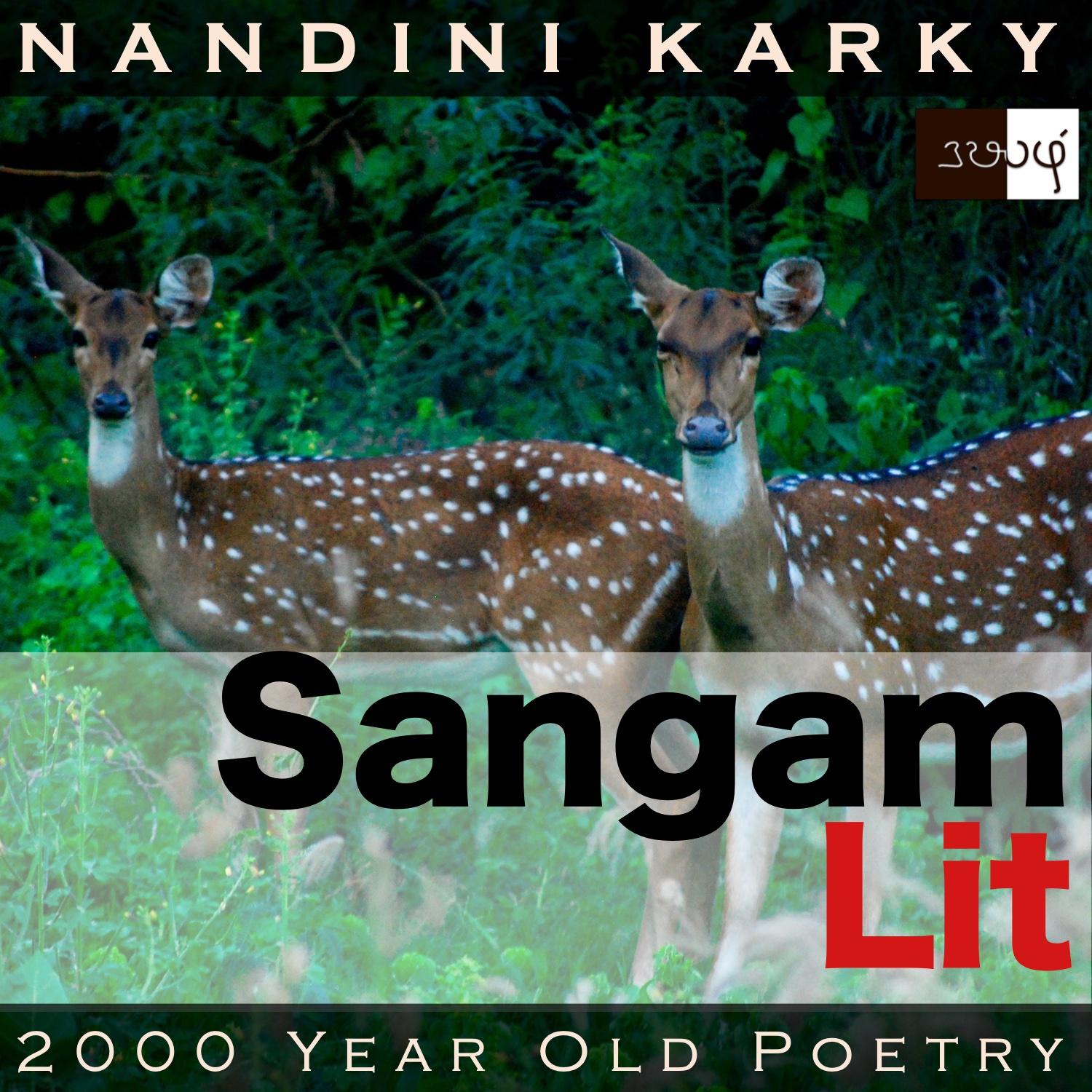Podcast: Play in new window | Download
Subscribe: Apple Podcasts | Spotify | Amazon Music | Android | iHeartRadio | Email | TuneIn | RSS | More

In this episode, we perceive the rising angst in a lady’s heart as the season changes, as portrayed in Sangam Literary work, Kurunthogai 319, penned by Thaayankannanaar. The verse is situated in the forests of ‘Mullai’ and speaks in the voice of the lady to the confidante, in response to the confidante’s words asking the lady to bear with the man’s parting.
மான் ஏறு மடப் பிணை தழீஇ, மருள் கூர்ந்து,
கானம் நண்ணிய புதல் மறைந்து ஒடுங்கவும்,
கையுடை நல் மாப் பிடியொடு பொருந்தி,
மை அணி மருங்கின் மலையகம் சேரவும்,
மாலை வந்தன்று, மாரி மா மழை;
பொன் ஏர் மேனி நல் நலம் சிதைத்தோர்
இன்னும் வாரார்ஆயின்,
என் ஆம், தோழி, நம் இன் உயிர்நிலையே
‘It’s an evening in the season of rains and he returns not’ is the lament in this verse. The opening words ‘மான் ஏறு மடப் பிணை தழீஇ’ meaning ‘a male deer enfolds its naive mate’ depict a moment of real or perceived intimacy in animals. This same theme continues in ‘கையுடை நல் மாப் பிடியொடு பொருந்தி’ meaning ‘a fine animal with long hands unites with its mate’, talking about an elephant, no doubt. In ‘மாலை வந்தன்று, மாரி மா மழை’, the time of the day and the season is revealed for it means ‘the evening is here, and the huge dark clouds of rain too’. The recurring theme of separation and pining can be sensed in ‘இன்னும் வாரார்ஆயின்’ meaning ‘if he still does not return’. Ending with the words ‘நம் இன் உயிர்நிலையே’ meaning ‘the future of our sweet life’, the verse welcomes us to know more.
Embracing animals and abstaining man – That seems to be the core here! The context reveals that the man and lady were leading a happy, married life when the man parted away to gather wealth. The lady languishes in his absence and the confidante, worries about her friend, asks the lady to face the separation in a better manner. To the advising confidante, the lady says, “Male deers embrace their innocent females, and filled with intoxication, retire to hide in the bushes that abound in the forests. And, those fine animals with long tusks unite together with their females and move towards the mountains adorned by kohl-dark clouds. All this happens in the evening, that too of the dark, rainy season. The one, who ruined the fine health of my form akin to gold, returns not, still. What is to become, my friend, of the state of my sweet life?” With these words, the lady refuses to accept the confidante’s words of advice and expresses how impossible it was for her, to bear with the man’s parting.
What could be the different element we can filter in this repeating theme of separation? The lady first takes us to the forests and points to the dense bushes and asking us to peer closely, she points to the male and female deer hugging and hiding there. From there, she transports us to another landscape of hills and here, as pitch-black clouds surround the peaks, she asks us to zoom on to a male and female tusker in togetherness. Whatever be the spread of the land, and whatever be the species therein, the males and females will be huddling together for it’s an evening hour in the season of rains, she explains. Then, coming to her situation, the lady says, the person, who was the reason for the ruin of her health and beauty, however, does not return. If this were to continue, what would happen to my life, the lady wonders in worry.
Here’s a classic example of how the mind seems to see the world outside as having everything that one yearns for. Even the animals in the forests and hills are joyously united with their mates, but I do not have that fortune, cries this lady. Wonder what words of response the confidante has for this. Moving away from the scene presented, I want to ask why poet after poet would talk about the pining woman at home? Are they talking about their women as they travel the land, penning verses and earning wealth? Or were all these poems commissioned on this particular theme by a patron? And if it was, what could be the purpose that patron had in mind? More questions than answers indeed, but let’s keep asking and hope time will show us the answers we seek!




Share your thoughts...